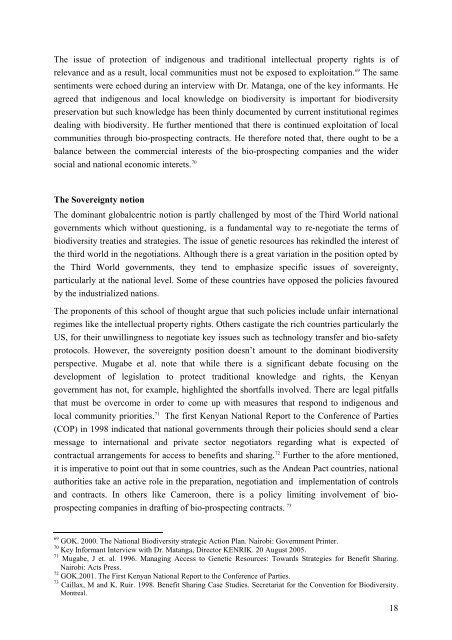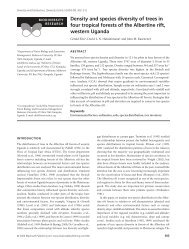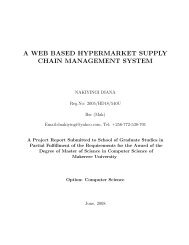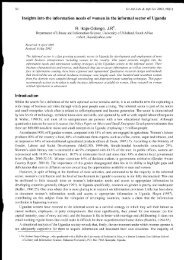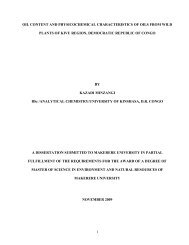THE UNIVERSITY OF LEIPZIG
THE UNIVERSITY OF LEIPZIG
THE UNIVERSITY OF LEIPZIG
You also want an ePaper? Increase the reach of your titles
YUMPU automatically turns print PDFs into web optimized ePapers that Google loves.
The issue of protection of indigenous and traditional intellectual property rights is of<br />
relevance and as a result, local communities must not be exposed to exploitation. 69 The same<br />
sentiments were echoed during an interview with Dr. Matanga, one of the key informants. He<br />
agreed that indigenous and local knowledge on biodiversity is important for biodiversity<br />
preservation but such knowledge has been thinly documented by current institutional regimes<br />
dealing with biodiversity. He further mentioned that there is continued exploitation of local<br />
communities through bio-prospecting contracts. He therefore noted that, there ought to be a<br />
balance between the commercial interests of the bio-prospecting companies and the wider<br />
social and national economic interets. 70<br />
The Sovereignty notion<br />
The dominant globalcentric notion is partly challenged by most of the Third World national<br />
governments which without questioning, is a fundamental way to re-negotiate the terms of<br />
biodiversity treaties and strategies. The issue of genetic resources has rekindled the interest of<br />
the third world in the negotiations. Although there is a great variation in the position opted by<br />
the Third World governments, they tend to emphasize specific issues of sovereignty,<br />
particularly at the national level. Some of these countries have opposed the policies favoured<br />
by the industrialized nations.<br />
The proponents of this school of thought argue that such policies include unfair international<br />
regimes like the intellectual property rights. Others castigate the rich countries particularly the<br />
US, for their unwillingness to negotiate key issues such as technology transfer and bio-safety<br />
protocols. However, the sovereignty position doesn’t amount to the dominant biodiversity<br />
perspective. Mugabe et al. note that while there is a significant debate focusing on the<br />
development of legislation to protect traditional knowledge and rights, the Kenyan<br />
government has not, for example, highlighted the shortfalls involved. There are legal pitfalls<br />
that must be overcome in order to come up with measures that respond to indigenous and<br />
local community priorities. 71 The first Kenyan National Report to the Conference of Parties<br />
(COP) in 1998 indicated that national governments through their policies should send a clear<br />
message to international and private sector negotiators regarding what is expected of<br />
contractual arrangements for access to benefits and sharing. 72 Further to the afore mentioned,<br />
it is imperative to point out that in some countries, such as the Andean Pact countries, national<br />
authorities take an active role in the preparation, negotiation and implementation of controls<br />
and contracts. In others like Cameroon, there is a policy limiting involvement of bioprospecting<br />
companies in drafting of bio-prospecting contracts. 73<br />
69<br />
GOK. 2000. The National Biodiversity strategic Action Plan. Nairobi: Government Printer.<br />
70<br />
Key Informant Interview with Dr. Matanga, Director KENRIK. 20 August 2005.<br />
71<br />
Mugabe, J et. al. 1996. Managing Access to Genetic Resources: Towards Strategies for Benefit Sharing.<br />
Nairobi: Acts Press.<br />
72<br />
GOK.2001. The First Kenyan National Report to the Conference of Parties.<br />
73<br />
Caillax, M and K. Ruir. 1998. Benefit Sharing Case Studies. Secretariat for the Convention for Biodiversity.<br />
Montreal.<br />
18


